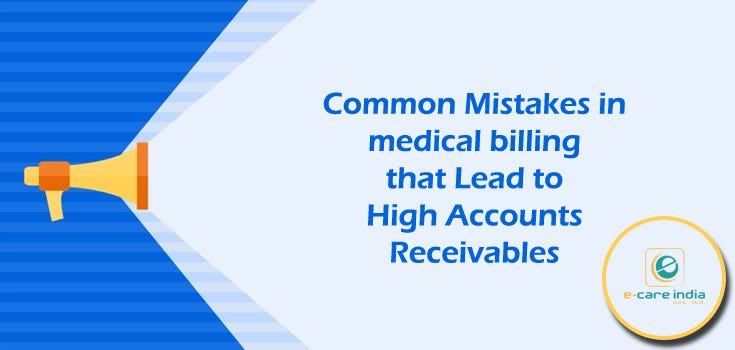The success of medical billing companies depends on their financial health. However, there are several factors that affect these companies’ revenue cycle management. One of the main reasons is high account receivables that interrupt the cash flow. Amidst the new medical reforms, complicated billing and coding processes, training staff, and keeping up with the new standards, many medical billing companies struggle with their aging AR. They can improve their account receivable management by avoiding some of the common mistakes that lead to high account receivables:
1. Ignoring Claim Denials: One of the prime reasons for high accounts receivables is claim denials. Claims that are filed can be rejected by an insurance company for several reasons including, billing/coding errors, missing patient information, submission of duplicate claims, and delayed filing. It is important that the account receivable management team pay attention to the denied claims, analyze & correct errors, and re-file them on time. Delay in re-filing can lead to high account receivables.
2. Write-off Errors: Amidst the various medical billing processes, most medical billing companies fail to review write-offs, which is crucial. The write-off amount is the difference between the actual charge and allowed a charge for medical services provided to a patient. The insurance company usually pays this amount to the Provider under the category ‘uncovered services.’ Sometimes, there can be errors during write-offs. If they are overlooked, Providers will not get the owed payment, resulting in high account receivables. The account receivable management team must frequently review the contractual and non-contractual write-off reports to improve cash flow.
3. Poor Billing Staff: As new healthcare changes stormed the US healthcare industry, medical billing companies started providing intense training to their staff on the new medical billing and coding techniques. With less time for training, the staff performed poor medical billing and coding resulting in vast claim denials. It further impacted the account receivable management. Employing highly-skilled professionals is the only way to ensure unsurpassed medical billing. Else, medical billing companies can choose to outsource to offshore vendors that already come with a team of trained professionals.
4. Neglecting Patient Collections: Gone are the days when Providers and medical billing companies depended on insurance companies for payments. As the traditional fee-for-service model migrated to more performance-based payment models such as Self-pay, billing companies are relying more on patients for reimbursements. Therefore, patient collections should be given extra care to improve account receivable management. Some ways to enhance patient collections include, establishing a proper insurance plan, updating patient information frequently, collecting payment at time-of-service, and explaining patients’ financial responsibility.
5. Failure to Address Outstanding AR: Another common mistake that most medical billing companies make is neglecting outstanding patient balances. Maintaining an Aging AR Report is essential for a good Account receivable management. This report will prompt the staff if the revenue has not been collected within 30 days from the date of filing. The billing team must follow-up on the outstanding AR that is more than 30 days old and makes sure they are paid for. The probability of claims getting paid lessens as the AR ages more than 90 days.
About e-care India:
The best way to keep your account receivables in check and avoid the aforementioned billing mistakes is partnering with offshore vendors. E-care India is the best bet if medical billing companies are looking for a reputed and experienced offshore vendor. It comes with a Disaster Recovery Centre that makes sure that the business stays unaffected during emergency situations. With 3 offshore medical billing delivery centers, this top-notch offshore medical billing company manages accounts receivables efficiently for uninterrupted cash flow. Acting like a virtual back office from India, e-care will continue to provide its endless support 24/7. To know more about e-care and its services, log on to www.ecareindia.com.

Comments
Post a Comment